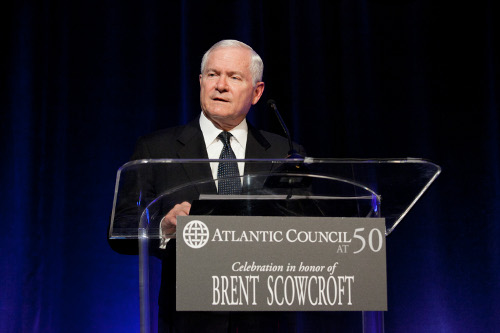
From Jorge Benitez, New Atlanticist: Former Secretary of Defense Robert Gates has revisited perhaps the most controversial speech in his career. In his valedictory address to European leaders last June in Brussels, Gates sparked a firestorm of debate by declaring that NATO had become a “two-tiered alliance,” divided “between those willing and able to pay the price and bear the burdens of alliance commitments, and those who enjoy the benefits of NATO membership – be they security guarantees or headquarters billets – but don’t want to share the risks and the costs.” Furthermore, Gates warned that unless decisive action is taken, he foresaw “a dim, if not dismal future for the transatlantic alliance. . . .”
Tuesday evening, Gates chose to reignite the controversy over his Brussels speech in his keynote address at a special gala in honor of his former boss, Brent Scowcroft. . . .
Gates admitted that his earlier speech did not paint a rosy future for NATO. “Shortly before the leaving the Pentagon, I delivered a pretty tough speech in Brussels about a potential dismal future for NATO if allies didn’t get serious about their defense investments capabilities.” After so many commentators had misunderstood or misrepresented his main argument in the Brussels speech, Gates used the occasion to remind his audience of his original intent. “The main purpose of the Brussels speech, and the main message I wanted to send to our European friends, was to convey this warning: that a generation of senior American policymakers that have been the strongest defenders of the Atlantic Alliance are departing or have departed from positions of responsibility in Washington. Henry Kissinger, Zbig Brzezinski, the late Larry Eagleburger, Jim Jones, myself, and of course Brent. We were all to one degree or another influenced by our formative experience during the Cold War.”
The new leaders of US foreign policy will be more critical of NATO and the growing capabilities gap within the transatlantic security relationship. “The politicians and policymakers that will follow us, frankly, will not have the same historical, personal, and indeed emotional, tie to Europe, and may not consider the return on America’s investment in Europe’s defense worth the cost. And that would be a tragedy.”
Nevertheless, Gates continues to believe in NATO’s valuable contribution to US national interests and quoted his mentor’s insightful analysis of NATO’s continuing relevance to the security of the United States. “[A]s Brent put it so well back in May, in this kind of a world it’s more important, more essential than ever that we take care of our closest and most important relationship, and community of common values. And that community, for all of its flaws and troubles, is still Europe.”
Image: robert-gates-scowcroft-dinner.jpg
